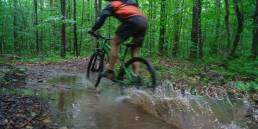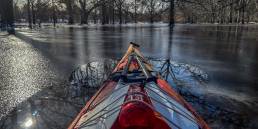For many, ski patrolling is a dream job—after all, there aren’t many positions where you get paid to ski, not to mention score first tracks and last run. If you’re interested in how to become a ski patroller, there are some steps you can take to make your transition into patrolling more smooth.

What to Know About Becoming a Ski Patroller
The first thing to know about becoming a ski patroller is that every ski area does things a little differently, each with its own standards, requirements, and perks. There are also many different ways to patrol. For example, there are full-time and part-time positions along with paid and volunteer positions. There are also opportunities to work in the first-aid room for those who want to work at the resort but aren’t confident in their skiing ability.
Steps to Become a Ski Patroller
Below is a schedule of the steps you can take to make your start to ski patrolling a little easier.
The Winter/Spring Season Before
Contact the mountain(s) you want to patrol at. If you’re considering patrolling, you likely have a mountain in mind where you want to work. Reach out to where you want to patrol and learn how their ski patrol program operates. Ask if they allow shadowing of their current patrol. If so, take advantage of the opportunity.
Shadow ski patrol for a few days. Following a patrol team is an excellent way to see if ski patrolling is something you enjoy and are capable of doing. It also gives you a great head start when you join the patrol, as you’ll know the ski patrol’s routines and expectations already. Not every ski area allows shadowing. If the mountain you’re interested in patrolling at doesn’t, consider finding one that does and put your time in there for a season.
Talk to patrollers from other mountains. Different mountains provide different experiences. Whether you’re thinking about ski patrolling as a career or as a volunteer gig, it’s a good idea to chat with patrollers from other ski areas to learn what it’s like to work at different mountains.
Work on your skiing/snowboarding skills. The skiing/snowboarding ability level required to join the patrol depends on the mountain. That said, a good starting point is to make sure you can comfortably ski/ride every trail on the mountain. This includes glades, moguls, and any unlisted trails—be able to ski or ride the resort boundary to boundary. You’ll also want to learn all the trail names along with their nicknames.
The Summer Before
Look and sign up for Outdoor Emergency Care (OEC) courses. Providing first aid is integral to being a ski patroller. OEC is the first aid course of the National Ski Patrol (NSP) and is required of all NSP members. The summer might seem early to think about ski patrolling, but many OEC courses start in August and run on weekends through November/December—you don’t want to miss sign-up or the first couple of classes.
Start applying to mountain(s). While you might not be thinking about skiing during the dog days of summer, many mountains are busy planning for winter. Summer is a great time to fill out applications, look for job openings, and introduce yourself to patrol directors—which is especially important if you’re looking for an extremely competitive full-time patroller position.

The Fall Before
Attend an OEC course. As mentioned above, many OEC courses run on weekends, which often means long days. However, the courses are important—learn as much as possible and make sure to pass your exams and evaluations. The course can feel intimidating, but it’s a fantastic introduction to the ski patrol community.
Start gathering gear. One of the things you’ll learn in your OEC course and from shadowing ski patrollers is what kind of tools to carry on the slopes. This is a great time to start gathering the supplies you need, from the gear to work on the mountain to personal and medical gear to a pack to carry it all.
Complete your applications. No matter what type of patroller position you’re applying for, you’ll likely need to fill out an application. You’ll want to submit your application before the mountain plans to open. Start applying, even if you haven’t completed your OEC course.
Pass your OEC exam. This is one of the most stressful steps to becoming a ski patroller. The OEC exam has both a paper and practical component. If speaking or performing in front of an audience gives you anxiety, this can seem especially daunting. Remember, everyone at the exams wants you to pass—attending classes and practicing your first aid skills is a recipe for success.
First Season Patrolling
Be willing to learn. Ski patrol is a wonderful community and you’ll quickly learn the quirks of the patrol you are part of. Observe your fellow patrollers, ask questions, and prepare to learn—there’s a lot to take in.
Practice, practice, practice. When given the chance to practice your skills, take it! The more you practice, the more comfortable you’ll become with your skills and team and the more prepared you’ll be when it’s the real thing. This is especially true for your first aid skills, which are perishable and require regular practice to stay sharp.
Don’t rush your candidacy. When you first start patrolling, you’ll usually be considered a candidate and will have to earn your status as a full patroller. It’s easy to feel eager to earn your jacket or cross but enjoy your time as a candidate—learning new skills, becoming familiar with your “home” mountain, and becoming a member of the patrol team. Before you know it, you’ll be looking back on years of patrolling and fondly reminiscing on your time as a candidate.

Have Fun and Do Good
If you take away one thing from this article, it’s that ski patrolling is an incredible opportunity. It’s a position that is hard and at times heartbreaking, so take advantage of the good times and have as much fun as possible—enjoy the sunrises and sunsets, savor the soft turns, and carry the good memories of the team you join and people you’ve helped. Time flies when you patrol every day.
Haley Bissonnette
Haley is an outdoor enthusiast who has always been passionate about living the dream life. She's living hers by ski patrolling in the winter and bike patrolling in the summer. When not working, she adventures with her partner and two fluffy dogs.
Related Posts
April 2, 2024
10 Tips for Mountain Biking Etiquette During Mud Season
One rough spring could ruin the…




